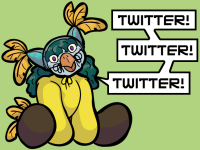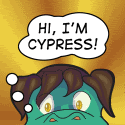Wikipedia, Notability, and Webcomics
Those of you who follow more than just this comic may be familiar with the WikiDrama back in January where over 50 webcomics were deleted from Wikipedia, with several more speedily deleted or otherwise nominated for deletion thanks to 'lack of notability', as determined by a few zealous mods.
It's about time someone told them what they accomplished. Namely, a lot of ill will from the people who SHOULD be making Wikipedia better. Since I can only edit the article itself so much, I wanted to post my opinions here.
Disclaimer: I create Last Resort, a weekly webcomic. You're probably reading this from the webcomic's page, but if you're someone random who's probably here because you have nothing better to do than argue with me about this, you might be coming here from the blog's permalink or just looking for an excuse to ignore everything I have to say past this point, so there it is.
If you think this makes my opinion invalid . . . you're part of the problem.
Wikipedia was intended as a site anyone can edit, with information on whatever people find appropriate. For the longest time, I even had my default search engine in Firefox set to Wikipedia, because whenever I googled anything for my classes I ended up going there anyway. But Wikipedia isn't for everyone anymore, Google's my default search engine again, and "Deletionist" drama like this is part of the reason why.
Creating articles is daunting, but adding edits to them is easy once started. Deleting them is apparently easier for mods and admins than editing, tagging it for cleanup and letting someone else do your work for you, or even, y'know, leaving it alone because it's probably fine as is. Then again, I suppose it's easier to just delete everything than to deal with the fact people have different opinions of what's worthwhile.
Yes, there are lots of webcomics out there, and quite frankly there are also a lot of bad webcomics too. By this same token, there are also lots of bad magazines, bad restaurants, bad small businesses, bad dot-coms . . . and not everyone is Mother Teresa when it comes to taking criticism either. We just happen to notice the drama surrounding webcomics more because it's all online and eventually if it gets bad enough it gets archived on Encyclopedia Dramatica for the non-involved to laugh at.
Comics in general (and webcomics in particular) get a lot of grief from people, even other artists, because it's either "not an art form", "not profitable", or it's "for children". Naturally, they have irrefutable proof in the inescapable fact that Japan is a third-world country. It's a growing medium, especially in places like the United States where there seems to be a corporate monopoly on creative content, and as such has only taken off with the internet.
Ten years ago if you wanted to be anything that involved creating stuff people actually enjoyed looking at, you either had to go to New York, Hollywood, or Florida and hope you landed a creative gig of some kind, or else you languished in obscurity on page 27X of your local newspaper. Maybe you submitted letters to publishers, and if they weren't immediately tossed onto the slush pile, you'd get a nice form letter back that said absolutely nothing of value beyond "Sorry, Play Again". Of course, all of this is said with the assumption that you already were a United States citizen with enough disposable income to take such risks.
I have seen beautiful works from far-flung places of the globe I never would have found otherwise. I have found stories with huge fandoms, profitable enterprises, and more creative energy expended collectively than any single publisher in the world could manage. I have found piles of absolute crap, and side-stepped the crap to find tales and art to die for. I have found people willing to persue the American Dream doing what they love and telling the stories in their heads to anyone who'll listen, and for a few of 'em it's even worked.
I'm getting flowery here, but hell, we're talking about a revolution in the creative process like nothing seen before, where anyone and everyone who thinks people want to listen to them can give it a shot, and the cream rises to the top one way or another. A lot like Wikipedia, really, except in Wiki-land the admins and moderators seem to think they're better than other users, and somehow this means they have the right to quash their work. If Webcomics worked the way Wikipedia works, Scott Kurtz, Fred Gallagher, and R.K. Milholland would be banding together to nuke ComicGenesis's servers from orbit.
Webcomics seem to putter along just fine with anyone and everyone getting involved in the process. Why can't Wikipedia be the same?







6 Comments:
I couldn't agree with you more. Sometimes the mod there can be real...for lack of a better word, f---tards. *Still bitter about the article about DMFA's deletion.*
Seriously, I think that the notability criterion for websites are the worst problem. They seem to exclude all but the most well-known sites, no matter how notable some other sites may be. They seriously need review. And not by the mods who enforce them, but by the community as a whole. I hope that they would be more reasonable.
The problem is twofold: One, the current Hierarchy at Wikipedia is HEAVILY entrenched, and Two, there is no good alternative to Wikipedia.
No, Wikifur and Comixpedia do not count. They are not only highly specialized wikis, but nobody really cares about the things because they don't have enough people to police themselves properly either.
(And in WikiFur's case, they have their own entrenched hierarchy that thinks they can get away with the same shit the 'Big Boy Wiki' can. I can't even take a babyfur's "personal" article to the woodshed without getting chastised by the mods.)
Your argument would carry more weight if you recognized that notability is an important criterion for inclusion of articles in an encyclopedia and that many webcomics are not notable and therefore should not have articles about them in wikipedia. It would also be helpful to propose rules for distinguishing between notable and non-notable web comics, possibly pageviews.
Notability in its current application, especially for online-based communities, is a glorified shell game. If there were trade articles for webcomics the way published comics do, perhaps there would be less argument.
As it stands, finding 'appropriate' sources is tricky, especially for webcomics. Does having a featured article on WikiFur count? Or maybe being slagged on by John Solomon? Maybe winning an award like the WCCA? I would argue that (for the most part) these are sufficient; most people on Wikipedia would not.
Furthermore, it takes more than statistics to gain notability. It would certainly HELP to have them in there as guidelines, especially as an argument to use if there's a tight call on whether an article is worth keeping, but I can't honestly say that Wikipedia should be a "You must be this tall to ride" kind of place.
I use Wikipedia constantly. It's advantageous, as a beginning stage. Yet, I am dependably - dependably - aware of the way that it's just as solid as the weariness dimensions of able individuals to discredit clumsy however entitled individuals - and that sometime, the incompetents dependably win that battle.
https://wikipagewriting.services/
Thoughtful exploration of Wikipedia’s notability standards, especially for niche subjects like webcomics. For those researching how to create a Wikipedia page for your company, this post underscores a key hurdle: demonstrating verifiable significance beyond self-promotion. Even in digital spaces, Wikipedia demands independent recognition—a lesson for businesses and creators alike!
Post a Comment
Subscribe to Post Comments [Atom]
<< Home